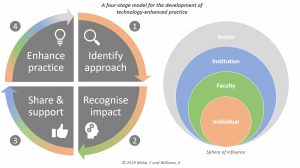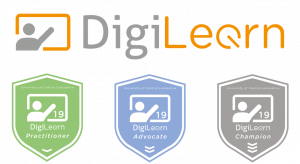

We are delighted to bring this guest blog post to you from Chris Melia, senior learning technologist at the University of Central Lancashire (UCLan) about the work of Chris, and his colleague Kevan Williams in developing their innovative DigiLearn programme.
The technology enabled learning and teaching team at the university uses the Jisc digital capabilities framework to inform all their digital initiatives and their new digital capabilities mapping tool, DigiPath, is based on the six areas identified by the six elements within that framework.
The UCLan DigiLearn programme
“At the University of Central Lancashire, we recognise the importance of developing digital capabilities across our staff and student community. In order to do this effectively, we have had to look at a different approach…”
Kevan Williams, Technology Enabled Learning and Teaching Manager
Encouraging academic colleagues to recognise, develop and share best practice
Developed by Chris Melia and Kevan Williams of UCLan’s Technology Enabled Learning and Teaching (TELT) team, DigiLearn is an institutional framework that encourages academic colleagues to both recognise and share best practice, as well as develop their own digital capability and skillsets.
Underpinning the framework is a four-stage model (image below), containing two main elements. The first (below left) starts by looking at existing practice and ‘what works well?’, then recognising value and impact and sharing experience and supporting others, with an end goal of enhancing practice.
The second element (below right) demonstrates how one’s ‘sphere of influence’ expands as they move through the stages, from identifying an approach as an individual, right through to enhancing practice and influencing sector. This relationship is represented by the arrows surrounding the four stages of the model.

“It’s really about building a community of practice, where we can all work together and support one another to develop the student experience and prepare them for the digital workplace”
Chris Melia, Senior Learning Technologist
Faculty-wide communities
At the heart of the DigiLearn framework are faculty-wide communities of digitally-inspired practice. These spaces encourage colleagues to overcome divisional barriers and engage in interdisciplinary conversation.
“Being part of this community means that I am able to connect with members of my faculty to innovate, share, learn and support each other as we introduce ideas into the classroom”
Kirstie Harrison, Lecturer in Adult Nursing
The DigiLearn framework
Building on these principles, a framework was developed to again encourage the sharing of best practice, but also a promote a peer approach to digital development – with colleagues acting as each other’s digital mentors.
The framework and accompanying role profiles are defined around three levels of award, appropriately titled to best represent the relevant level of recognition and achievement. Participating colleagues always start with the Practitioner route and progress upwards through the programme, with each level acting as a pre-requisite for the next.
There are four parallel strands embedded across each level of award, the first of which sees colleagues participate in DigiPath, the university’s new digital capabilities mapping tool based on the six areas identified by Jisc’s digital capabilities framework.
Additional criteria encourage colleagues to share best practice, initially at faculty level (Practitioner), moving on to institutional level (Advocate) and finally, sector level (Champion). This approach maps back to the ‘sphere of influence’ in the underpinning model, with an individual’s sphere expanding as they achieve the higher levels of the programme.
The evidence submitted includes a combination of blog posts, written and video case studies, presentations and publications. As colleagues progress through the programme, they are also required to evidence how they have supported and encouraged peers to move along the framework. This mutually supportive, self-fuelling approach ensures that contribution and progression is driven from within the academic teams, with pedagogy recognised as the main driver to success.
“The DigiLearn programme is celebratory in its nature, but also progressive in its purpose. It’s motivated me to upskill and enhance my digital pedagogy, but also given credence to my long-established approaches to teaching.”
Andrew Sprake, Lecturer in Sport and Physical Education
Since its initial Faculty of Health and Wellbeing launch in September 2018, the impact and momentum generated by DigiLearn has proven to be extremely positive. The video case study below demonstrates just some of the impact on colleagues across a variety of academic disciplines.
The initiative offers the opportunity for continuing annual development, as more colleagues achieve recognition for their capabilities and worthwhile enhancements to the framework are identified and embedded. DigiLearn has become a recognised measure of personal achievement for academic colleagues at UCLan, alongside the benefits acknowledged by the university’s students of being part of an active, technology-enabled and digitally creative learning community.
Next steps
The next steps for UCLan, are to embed DigiLearn across all their academic and student development programmes and provide an online platform to share technology-enhanced practice across the sector.
The University have now made their DigiLearn framework, role profiles and underpinning model available to other institutions (link opens in new window). To join their new DigiLearn Sector Community, simply submit the sign-up form (link opens in new window).
Contact details
Chris Melia – Senior Learning Technologist
Email: CMelia@uclan.ac.uk Twitter: @ChrisLearnTech
Kevan Williams – Technology Enabled Learning and Teaching Manager
Email: KWilliams@uclan.ac.uk Twitter: @UCLanTELT
TELT Team blog: https://teltblog.uclan.ac.uk/
DigiLearn hashtag: #UCLanDigiLearn

